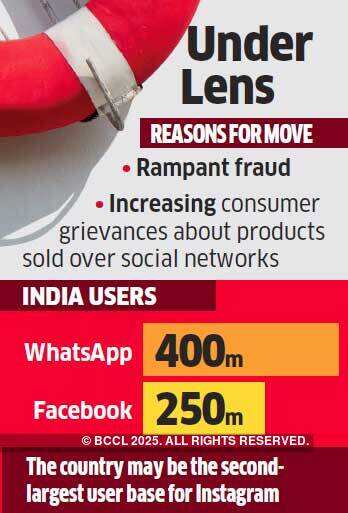 BENGALURU: The government is thinking of regulating products and services sold on social networks such as Facebook, Instagram, Pinterest and WhatsApp under the upcoming rules to protect consumers who transact on ecommerce portals. The move comes amid increasing complaints, both on the National Consumer Helpline and other portals that track consumer grievances, about products sold on marketplaces attached to social networks, according to officials and people aware of the development.
BENGALURU: The government is thinking of regulating products and services sold on social networks such as Facebook, Instagram, Pinterest and WhatsApp under the upcoming rules to protect consumers who transact on ecommerce portals. The move comes amid increasing complaints, both on the National Consumer Helpline and other portals that track consumer grievances, about products sold on marketplaces attached to social networks, according to officials and people aware of the development.The Ministry of Consumer Affairs, which is chalking up rules for consumer protection on ecommerce websites and apps, is thinking of including social networks under its ambit as the popularity of Facebook Marketplace, Instagram’s Shoppable Posts and WhatsApp Business is growing in India.
“There are a large number of products and services being sold on social networks. They (social networks) are facilitating sales through P2P (peer-to-peer) as well as some brands creating storefronts to sell directly to consumers,” said a person aware of the matter. “They will need to follow the same rules as other marketplaces and ecommerce websites.”
One reason why the government seeks to regulate sales on social networks is due to higher instances of fraud being re- ported on such platforms.

While marketplaces on social networks are similar to other classifieds and social selling websites, their reach makes them prime targets for scamsters.
Instant messaging app WhatsApp has over 400 million users in India, while Facebook is estimated to have close to 250 million users. India is said to house the second largest user base for Instagram anywhere in the world.
Officials, however, say that consumer protection rules will only partly solve the problem of online fraud on ecommerce and social networks. A lot of online scams that start on P2P selling platforms quickly move to messaging apps such as WhatsApp and Telegram, which cannot be tracked due to their encryption feature.
“We have been getting a lot of complaints regarding scams on social networks and payment apps. This can only be fully solved through education of the consumer,” said an official. “The consumer protection rules will be uniform across all platforms where consumers buy goods and services online.”
In a poll by online community platform LocalCircles, 46% of respondents said they had been subject to fraudulent activity while purchasing a product or service through Facebook, Instagram, WhatsApp or other social networks. Over 85% of respondents said social networks should be subject to ecommerce rules and policies.
ET had reported earlier that the Ministry of Consumer Affairs had given the public and stakeholders time until December 2 to submit feedback for its Draft Consumer Protection (e-commerce) Rules.
No comments:
Post a Comment